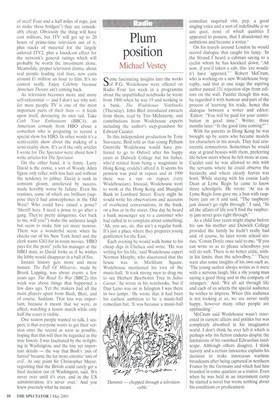Plum Position
Michael Vestey
Some fascinating insights into the works of P.G. Wodehouse were offered on Radio Four last week in a programme about the unpublished notebooks he wrote from 1900 when he was 19 and working in a bank, The Wodehouse Notebooks (Thursday). John Bird introduced extracts from them, read by Tim McInnerny, and contributions from Wode house experts including the author's step-grandson Sir Edward Cazalet.
In this independent production by Tony Staveacre, Bird told us that young Pelham Grenville Wodehouse would have preferred to go to Oxford after his happy years at Dulwich College but his father, who'd retired from being a magistrate in Hong Kong, couldn't afford it. It seems his pension was paid in rupees and in 1900 there was a run on rupees (very Wodehousian). Instead, Wodehouse went to work at the Hong Kong and Shanghai Bank in Lombard Street. Every night he would write his observations and accounts of overheard conversations, in the bank, on a bus or in the street. One day he heard a bank messenger say to a customer who had called in to complain about something, `Ah, you see, sir, this ain't a regular bank. It's just a place where they prepares young gentlemen for the East,' Each evening he would walk home to his cheap digs in Chelsea and write. `He was writing for his life,' said Wodehouse expert Norman Murphy, who discovered that the house was in Markham Square. Wodehouse mentioned his love of the music-hall. 'It took strong men to drag me to see Herbert Beerbohm Tree in Julius Caesar,' he wrote in his notebooks, 'but if Dan Leno was on in Islington I was there in two jumps.' He wrote that it had been his earliest ambition to be a music-hall comedian but, `It was because a music-hall comedian required vim, pep, a good singing voice and a sort of indefinable je ne sais quoi, none of which qualities I appeared to possess, that I abandoned my ambitions and became a writer.'
On his travels around London he would record dialogue that caught his fancy. `In the Strand I heard a cabman saying to a cyclist whom he has knocked down, "Ali now, if you'd taken a cab, this 'ere wouldn't have 'appened." ' Robert McCrum, who is working on a new Wodehouse biography, said that at one stage the aspiring author pasted 131 rejection slips from editors on the wall. Painful though this was, he regarded it with humour and part of the process of learning his trade, hence this dialogue between a writer and editor: `Editor: "You will be paid for your contribution in good time." Writer, three months later: "Is the good time coming?" ' With his parents in Hong Kong he was brought up by aunts who became models for characters in his novels. They had aristocratic connections. Sometimes he would stay at grand houses with them, preferring life below stairs where he felt more at ease. Cazalet said he was allowed to mix with the servants where he could observe the hierarchy and where clearly Jeeves was born. While staying with his cousin Lady Dean at Lyme Regis he came to know three schoolgirls. He wrote: 'At tea in Lyme Regis Joan gave me a bun with raspberry jam on it and said, "The raspberry jam doesn't go right through." I said, "In all the affairs of life you'll find the raspberry jam never goes right through." ' As a child four years might elapse before his saw his mother and Dulwich College provided the family he hadn't really had and, of course, he later wrote school stories. `Conan Doyle once said to me, "If you can write so as to please schoolboys you will do well. There is no better critic, within his limits, than the schoolboy." ' There were also some insights of his own such as, The young author always writes as it were with a nervous laugh, like a shy young man saying a good thing and in the company of strangers.' And, `We all act through life and each of us selects the special audience he wishes to impress. When this audience is not looking at us, we are never really happy, however many other people are applauding.'
McCrum said Wodehouse wasn't interested in current affairs and politics but was completely absorbed in his imaginative world. I don't think he ever left it which is perhaps why his fiction endures despite the limitations of his vanished Edwardian landscape. Although others disagree, I think naivety and a certain innocence explains his decision to make innocuous wartime broadcasts after being captured in northern France by the Germans and which had him branded in some quarters as a traitor. Even when he was held in an internment camp he started a novel but wrote nothing about his conditions or predicament.










































































 Previous page
Previous page